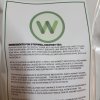Aloha9808
Member
(Sustainability).
I just use Organics they tend to have sustainability certifications and same goes with marketplace meats. I hope that will be enough to save Animals and Eco systems.
The point being: After learning how to grow on forums. I only eat Organic. And Take all Organics seriously.
This is where my Organic Sustainability practice is at it's best (Live Soil, Compost Tea). PPM.
I just use Organics they tend to have sustainability certifications and same goes with marketplace meats. I hope that will be enough to save Animals and Eco systems.
The point being: After learning how to grow on forums. I only eat Organic. And Take all Organics seriously.
This is where my Organic Sustainability practice is at it's best (Live Soil, Compost Tea). PPM.


